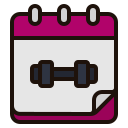Maximizing Health through Daily Fitness Habits
Adopting daily fitness habits holds the power to profoundly transform your overall health and well-being. Consistency in physical activity, alongside mindful living, has been linked to myriad benefits—from better cardiovascular health to improved mood and sharper mental focus. This comprehensive guide delves deep into strategies you can seamlessly weave into your everyday routine to unlock maximum health through daily movement, recovery, nutrition, and mindful practices. Whether you’re a fitness novice or seeking to refine your regimen, these insights are designed to equip you for a healthier, more vibrant life.
Building Consistent Exercise Routines
Setting Realistic Goals for Daily Movement
Goal setting is foundational to any lasting fitness habit. By identifying attainable targets—such as committing to a daily walk, a set number of push-ups, or a specific workout time—you establish a framework that encourages progress. Avoiding overwhelming or unrealistic ambitions helps prevent burnout and increases the likelihood of building a habit you can maintain indefinitely. Reviewing and adjusting these goals regularly allows you to recognize achievements and stay inspired, fostering a sense of accomplishment that propels you forward. Integrating flexibility into your plan ensures you can adapt to life’s demands without losing momentum, making daily movement a sustainable cornerstone of your well-being.
Creating Enjoyable Physical Activities
The key to making daily exercise stick is enjoyment. When your chosen activities bring pleasure, motivation follows naturally and makes skipping workouts less likely. Whether it’s dancing, hiking, cycling, or group classes, finding what sparks joy encourages long-term commitment. Experimenting with different modalities helps uncover what fits your personality and lifestyle best. Adding social elements, such as working out with friends or joining community groups, can further enhance enjoyment and accountability. Ultimately, when fitness feels fun, it transitions from a chore to an eagerly anticipated part of your day, profoundly impacting both physical and mental health.
Scheduling Workouts for Consistency
Organizing your workouts into your daily schedule is crucial for turning intention into action. Treat exercise appointments with the same importance as work meetings or family commitments. Whether you prefer morning workouts for an energetic start or evening sessions to unwind, blocking out time helps protect this vital aspect of your health. Digital reminders, visual calendars, and habit-tracking tools can reinforce commitment and help you stay organized. By embedding physical activity firmly into your routine, you transform fitness from an afterthought into an integral part of your identity, which is essential for lasting health benefits.

Fueling Workouts with Balanced Meals
Balanced meals provide the macronutrients—carbohydrates, proteins, and fats—necessary for fueling both endurance and strength-based activities. Carbohydrates replenish glycogen stores and offer immediate energy, while protein aids in muscle repair and growth. Quality fats play a role in sustained energy and cellular health. Eating balanced meals spaced throughout the day ensures your body is well-nourished, maximizing the effectiveness of your workouts and promoting quicker recovery. Prioritizing whole foods such as lean proteins, whole grains, healthy oils, and fresh produce creates a solid foundation upon which physical activity can flourish.
Hydration for Optimal Performance
Proper hydration is often overlooked but pivotal in achieving daily fitness success. Water regulates body temperature, lubricates joints, and transports essential nutrients, ensuring you perform at your best. Dehydration can lead to fatigue, cramping, and diminished focus, all of which undermine your fitness efforts. Integrating consistent hydration—by sipping water regularly, consuming water-rich foods, and listening to your body’s thirst cues—is a simple yet effective habit. Adjusting your intake based on activity level, climate, and personal needs further optimizes health and enhances the results of your daily movement routine.
Recovery Nutrition: Refueling After Exercise
Refueling after exercise is an essential yet sometimes neglected aspect of daily fitness habits. Consuming a mix of protein and carbohydrates within a reasonable window post-workout supports muscle repair, replenishes energy stores, and can even bolster your immune function. Recovery nutrition doesn’t require complicated supplements—it can be as simple as a protein-rich smoothie, yogurt with fruit, or a lean chicken sandwich. Prioritizing this post-exercise nourishment accelerates recovery, reduces soreness, and prepares your body for upcoming activities, rounding out your holistic approach to health.
The Power of Movement Breaks Throughout the Day
For those with long work hours or sedentary tasks, desk exercises offer a practical way to infuse movement into your daily routine. Simple stretches, chair squats, calf raises, and shoulder rolls can be performed without leaving your workspace. These low-impact activities increase blood flow, minimize muscle tension, and offer a much-needed mental reset. Setting reminders to pause every hour and incorporate a few minutes of movement keeps energy levels stable and helps prevent discomfort associated with inactivity. Desk exercises are especially valuable for maintaining consistency on busy days when a structured workout may not be possible.

Prioritizing Recovery and Rest
The Importance of Quality Sleep
Quality sleep is a cornerstone of both physical health and daily fitness progress. Restorative sleep enables muscle repair, hormone balance, and cognitive recovery, directly impacting energy, motivation, and performance. Insufficient sleep can undermine exercise efforts by impairing coordination, slowing recovery, and diminishing mental clarity. Cultivating a regular sleep schedule, creating a restful environment, and winding down with relaxing routines can all contribute to deeper, more restorative sleep. Prioritizing rest as part of your fitness regimen maximizes the benefits gained from your daily movement and supports overall well-being.
Stretching and Active Recovery
Incorporating stretching and active recovery as part of your daily routine helps maintain flexibility, reduce muscle tightness, and minimize injury risk. Gentle movement—such as yoga, dynamic stretches, or low-intensity walks—improves blood flow and aids in the removal of metabolic waste from muscles. Making time for these activities before or after workouts ensures your body remains supple and resilient. Emphasizing active recovery can alleviate soreness, support faster adaptation to new fitness challenges, and foster a sense of balance, completing the cycle of effort and rest necessary for sustainable progress.
Listening to Your Body’s Signals
One of the most important facets of daily fitness habits is learning to listen to your body. Tuning in to physical cues—like fatigue, persistent soreness, or changes in mood—helps you regulate intensity, prevent overtraining, and recognize when extra rest is needed. Self-awareness empowers you to adapt your habits based on your body’s feedback, avoiding injury and fostering a deeper, more intuitive relationship with movement. Trusting your body’s signals cultivates long-term health, making daily fitness not just a routine but a responsive, evolving practice.


The Role of Mindful Movement
Mindful movement involves bringing your full attention to each action, whether you’re exercising, stretching, or simply walking. By focusing on breath, posture, and bodily sensations, you heighten your awareness of how movement feels, making adjustments that enhance comfort and efficiency. Mindful practices like yoga, tai chi, or even slow, intentional strength training sessions can deepen your connection to exercise. This focus reduces the risk of injury, brings a sense of calm, and makes fitness a more rewarding, present-centered experience.

Managing Stress through Regular Exercise
Consistent physical activity is a proven strategy for managing stress, reducing anxiety, and improving mood. Exercise stimulates the production of endorphins and serotonin, neurochemicals responsible for feelings of well-being and relaxation. Whether it’s a high-intensity workout or a gentle walk, movement acts as a healthy outlet to process daily pressures and calm the mind. Incorporating exercise as a stress management tool allows you to approach challenges with a clearer mindset, fostering resilience and positively impacting other areas of your life.

Building a Positive Fitness Mindset
Cultivating a positive mindset around fitness is essential for lasting change. Focusing on progress rather than perfection—and celebrating small victories—fosters motivation and self-compassion. Instead of fixating on setbacks or comparing yourself to others, embracing your unique journey minimizes negative self-talk. Surrounding yourself with supportive influences and maintaining realistic expectations helps keep your motivation high. A positive outlook turns daily fitness habits into an empowering, confidence-building experience, making it easier to stay consistent and enjoy the process.
Micro-Workouts for Time Efficiency
Micro-workouts—short bursts of exercise lasting anywhere from two to ten minutes—are a practical approach for those with hectic schedules. These compact sessions, performed multiple times a day, can yield significant fitness benefits over time. By focusing on compound movements like squats, lunges, or push-ups, you maximize effectiveness in minimal time. Micro-workouts can easily fit between meetings, during TV commercial breaks, or as part of household tasks, ensuring that even on the busiest days, you dedicate time to your health.
Incorporating Movement into Daily Tasks
Seamlessly blending movement with daily responsibilities transforms ordinary routines into active opportunities. This could mean taking the stairs instead of the elevator, doing calf raises while brushing your teeth, or turning household chores into mini-workouts. Parking farther away or biking to errands adds extra activity without consuming additional time. Viewing these small changes not as chores, but as chances to nurture your body, makes an active lifestyle both accessible and enjoyable, no matter how demanding your day becomes.
Strategic Planning for Fitness Adherence
Proactive planning is essential for maintaining fitness momentum in a busy life. Anticipating obstacles—like travel, family commitments, or work deadlines—allows you to adjust your approach in advance. Preparing workout clothes the night before or having a backup plan for rainy days can remove barriers. Using planners, fitness apps, or accountability partners helps reinforce your commitment. With foresight and flexibility, you can safeguard time for movement and keep your health goals on track, even when life feels overwhelming.
Tracking Progress and Celebrating Milestones
Measuring Success Beyond the Scale
While body weight can be one metric, it should not be the sole indicator of health or progress. Focusing on non-scale victories—such as increased energy, better sleep, improved strength, or enhanced mood—offers a more comprehensive view of your growth. Noticing boosts in stamina, flexibility, or even confidence can be incredibly motivating. Documenting these qualitative shifts reinforces that health encompasses much more than numbers, helping you appreciate and celebrate the full spectrum of positive changes daily fitness brings.
The Value of Journaling and Self-Reflection
Journaling is a powerful tool for deepening self-awareness and tracking subtle changes in your health and fitness journey. Recording workout details, nutrition choices, emotional responses, and physical sensations helps identify patterns and areas for improvement. Self-reflection lets you recognize what works, celebrate milestones, and strategize when encountering obstacles. Having a written record can also provide perspective during challenging periods, reminding you of your resilience and motivating you to persist. Over time, your journal becomes a testament to your dedication and growth.
Celebrating Achievements to Stay Motivated
Taking time to acknowledge and celebrate your achievements reinforces positive behavior and boosts motivation. Whether you reach a strength milestone, complete a new activity, or maintain a consistent streak, recognizing these wins fosters feelings of accomplishment. Celebrating can be as simple as sharing your progress with friends, treating yourself to something special, or reflecting on your growth. These moments of recognition create emotional rewards, transforming fitness from a duty into an enjoyable and inspiring part of your life.
